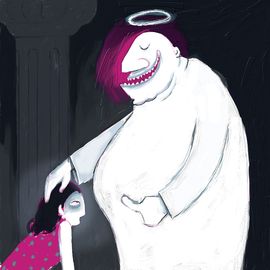The irony is scalding, shaming and total. Ariana Grande, a successful, empowered young woman of today, a globally known youth icon, no less, was blatantly groped while a million cameras rolled, in the presence of an ex-president of the United States and countless other powerful folk, by the officiating bishop at the funeral service of Aretha Franklin, an even more successful female icon whose most famous single is about a woman asking a man to show her (just a little bit) of respect.
While he was doing the groping, Bishop Charles Ellis III—former presiding bishop of the Pentecostal Assemblies of the World—also took it upon himself to tell Ariana that he had never heard of her, and that when he saw her name on the programme, he though she was ‘a new item on the Taco Bell menu’. Ha ha ha. Having thus advertised both his bumptious ignorance, and his casual, deeply ingrained racism, he then went on to patronisingly declare that he was impressed by her singing and that she was ‘an icon in her own right’.
Uh, Charles, she has four Grammy nominations, global fame, and a net worth of $45 million. She does not need you to vouch for her. Also, till you shot into the limelight for groping somebody young enough to be your granddaughter, certainly none of us in this corner of the world had heard of you.
Just as you would have expected, about half the people who were watching were deeply offended and took to Twitter to voice their disgust—at the fact that Grande’s dress was too short for church.
Yes, that was their main peeve, apparently.
Thankfully, the other, saner half demanded an apology from the bishop (which has just, reluctantly, been issued) and linked the incident to the #ChurchToo movement, which has followed close on the heels of the #MeToo movement, where more and more ex-seminarians, ex-altar boys, ex-priests and serving priests have come forward to speak of abuse at the hands of their seniors, the most high-profile case being the one involving Cardinal Theodore McCarrick, the former archbishop of the Catholic Church’s Washington archdiocese.
Mona Eltahawy, the Egyptian-American feminist/journalist, has started a #MosqueMeToo movement too, where thousands of women have come forward to report abuse during their Haj travel to Saudi Arabia. They talked about being groped even as they circle the Kaaba seven times in Mecca, by male fellow-pilgrims, security officers and ‘holy’ men.
In India, so many believers have similar stories about predators in sacred spaces. Jovial, smiling, ‘holy’ men with roving hands. Gurmeet Ram Rahim Singh. Asaram Bapu. Bishops, maulanas, granthis and sadhus. The list is endless and cuts across all faiths.
So why do these molestations happen? Not because somebody’s dress was ‘too short for church’ for sure. They happen because believers willingly ceded power to these middlemen. They accepted that somehow, this ‘holy’ class was greater—higher—closer to God than the rest of humanity. Practically Gods themselves, and so beyond human accountability—and that the rules that apply to everybody else do not apply to them.
This is the mistake. The same rules need to apply to everybody. If you would not leave your child alone with a stranger, please do not leave him alone with a priest. You are not being disrespectful if you do this, you are just being sensible.
Frankly, the sooner believers realise that they do not need a middleman to communicate with their Maker, that spiritual breakthroughs do not happen through rituals and incense and group frenzies, that there are no shortcuts nor power-brokers on the road to salvation, the safer our young ones will be.
editor@theweek.in


